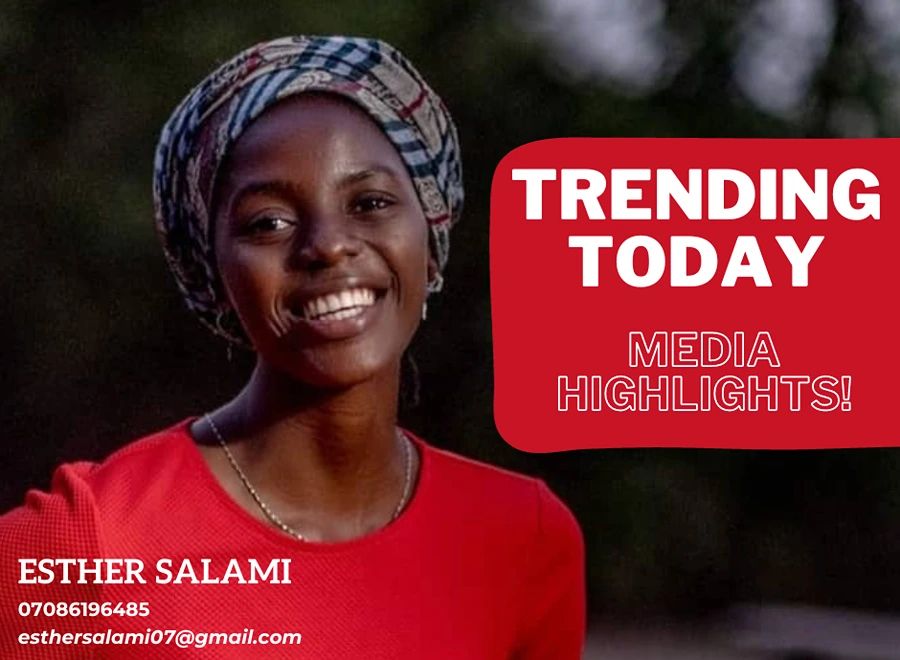Hello and welcome! In today’s trending news stories;
1. At the launch of his autobiography, Being True to Myself, in Abuja, former Jigawa State Governor Sule Lamido called on President Bola Tinubu to bring closure to the June 12 saga by paying the N45 billion allegedly owed to the family of Chief MKO Abiola for past federal contracts. Lamido said this symbolic act would correct historical injustices following Abiola’s denied presidency after the annulled 1993 election.
Former President Olusegun Obasanjo recalled how he appointed him Foreign Minister without prior acquaintance and commended his contributions to restoring Nigeria’s global image. Obasanjo stressed that building Nigeria remains unfinished and encouraged Lamido and others not to retire from national service.
President Tinubu, represented by Information Minister Mohammed Idris, described Lamido as a principled democrat and acknowledged his role in Nigeria’s political development. He reiterated the administration’s commitment to national unity, macroeconomic reform, and security. Also, former Transport Minister Rotimi Amaechi recounted Lamido’s loyalty to the PDP during the 2015 governors’ defection to the APC, calling him a “true party man.” The event attracted prominent political figures, including Namadi Sambo, Aliyu Gusau, Ayim Pius Ayim, Ken Nnamani, and Iyiorchia Ayu. Lamido’s book was widely praised for its honesty, depth, and contribution to Nigeria’s political history.
2. Nigeria has fully repaid the $3.4 billion emergency loan it received from the IMF in 2020, ahead of schedule on April 30, 2025. The loan, obtained under the Rapid Financing Instrument during the COVID-19 crisis, helped cushion the economy amid oil price shocks. The IMF has confirmed that Nigeria no longer appears on its list of debtor countries.
Nigeria’s total public debt remains high, ₦74.38 trillion domestically and $44.9 billion externally as of December 2024. Domestic debt is led by FGN Bonds (₦55.44 trillion), while Eurobonds ($17.32 billion) and World Bank loans ($16.56 billion) dominate external debt. Nigeria will continue to pay around $30 million annually in IMF service charges through 2029 and faces high debt servicing costs due to its reliance on commercial debt and weak naira. Analysts warn that despite this positive step, debt sustainability remains a concern. Fiscal reforms, revenue diversification, and prudent borrowing are critical going forward.
3. On Tuesday, May 13, former US President Donald Trump signed a $142 billion arms agreement with Saudi Arabia during the first stop of his Middle East visit. The White House described it as the largest defense sales deal in US history. Crown Prince Mohammed bin Salman also pledged up to $600 billion in future US investments, though many details remain unverified.
Trump confirmed plans to lift sanctions on Syria after a meeting with its new president, Ahmed al-Sharaa, who took power in 2024 after overthrowing Bashar al-Assad. In exchange, Sharaa offered access to oil, reconstruction contracts, and a proposed Trump Tower in Damascus. This marks the first in-person meeting between a US and Syrian leader since 2000. Trump’s decision has drawn scrutiny, especially given his ongoing business links in the region. Qatar’s proposed luxury jet gift for Trump’s post-presidency use has intensified conflict-of-interest concerns.
Trump avoided visiting Israel, citing the ongoing Gaza conflict and tensions with Prime Minister Benjamin Netanyahu. Talks about Saudi recognition of Israel under the Abraham Accords framework were acknowledged but left unresolved. Trump’s visit focused heavily on commercial deals and personal diplomacy, prompting criticism from lawmakers who warn of growing ethical risks in US foreign policy.
4. José “Pepe” Mujica, Uruguay’s former president, was globally admired for his humble lifestyle and died at 89. He had been battling esophageal cancer. A former guerrilla who spent over 14 years in prison, Mujica led Uruguay from 2010 to 2015. He lived, gave away most of his salary, and rejected the presidential mansion, earning the nickname the “world’s poorest president.”
His government legalized abortion, same-sex marriage, and marijuana, and achieved steady economic growth. Though criticized for rising public spending and unmet education reforms, Mujica remained free of corruption and widely respected. Announcing his death, President Yamandú Orsi thanked him for his deep love for the people.
5. Sean “Diddy” Combs is facing a federal trial in Manhattan on charges including sex trafficking, racketeering conspiracy, and transporting individuals for prostitution. The indictment, filed in September 2024, led to his arrest in New York, with prosecutors alleging he used his music empire to run a coercive sex trafficking ring. The trial began on May 12, 2025, and could result in a 15-year minimum sentence or life in prison if convicted.
His ex-girlfriend, Cassie Ventura, testified as the prosecution’s star witness, detailing years of alleged abuse. She claimed Combs was extremely controlling, dictating her appearance, career, and personal choices, and reacted with violence when defied. Cassie described repeated physical assaults, including a 2016 hotel incident caught on video where Combs beat and kicked her after she tried to leave a sex party.
She also testified about so-called “Freak Offs,” sex parties Combs allegedly forced her into between 2017 and 2018, where he watched her engage with other men. Cassie claimed she was pressured to participate even while menstruating and was once forced to let a man urinate in her mouth. She said Combs filmed these acts and used them as blackmail. To cope, she took drugs provided by him or his staff.
Combs has pleaded not guilty to all charges. The trial is expected to continue for several weeks.



